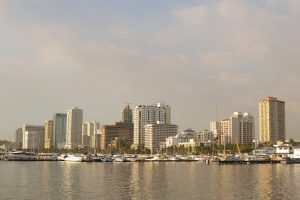The Philippine government said it is already reviewing the ongoing reclamation projects in Manila Bay after the United States embassy expressed concern over their long-term environmental impact and the alleged involvement of a blacklisted Chinese firm.
The Department of Foreign Affairs (DFA) confirmed with reporters that it is aware of the issues raised by the U.S. embassy. “The DFA is fully committed to working with relevant government agencies to ensure the safety and well-being of diplomatic missions accredited to the Philippines,” a spokesperson of the agency said.
One of the approved reclamation projects in Manila Bay is just 250 meters away from the U.S. embassy. In a statement sent to the media, embassy spokesperson Kanishka Gangopadhyay cited the irreversible damage that reclamation may cause. “We have expressed concerns about the potential negative long-term and irreversible impacts to the environment, the resilience to natural hazards of Manila and nearby areas, and to commerce,” he said.
The U.S. worries echo the longstanding opposition of green groups and local residents about the destructive impact of reclamation on marine habitats and the displacement of villages in coastal areas. Aside from the reclamation in the capital, a massive new airport is being constructed on the reclaimed land of Manila Bay in nearby Bulacan province. Residents also observed that flooding cases have become frequent after the resumption of reclamation activities over the past several months.
The Department of Environment and Natural Resources (DENR) said it has formed a panel to review the “cumulative impact” of all reclamation projects. “What has happened here is that individual projects were somehow processed without taking into consideration the cumulative impact of all the projects together. This is actually critical for future use,” DENR Secretary Maria Antonia Yulo-Loyzaga said in a media interview.
She added that reclamation could also undermine the government’s disaster response operations if a massive earthquake hits the urban region surrounding Manila Bay. “Reclamation has a certain value in terms of [the] economy. However, we need to do the cost benefit analysis in terms of impacts to geology and longer term impacts in terms of what could result from climate change,” Loyzaga said.
The second concern of the U.S. embassy is the involvement of a blacklisted Chinese contractor in the reclamation project.
“We are also concerned that the projects have ties to the China Communications Construction Co. (CCCC), which has been added to the U.S. Department of Commerce’s Entity List for its role in helping the Chinese military construct and militarize artificial islands in the South China Sea,” the embassy said in its statement. “The company has also been cited by the World Bank and the Asian Development Bank for engaging in fraudulent business practices.”
Indeed, CCCC is currently undertaking backfilling operations that will create three artificial islands in Manila Bay. The least the government can do is to verify the claim of the U.S. embassy that the company has a role in developing Chinese structures within the country’s maritime territory. The safety of the project should also be probed if the company is accused of engaging in fraudulent practices.
A senator whose family is behind the reclamation that will build hotels and casinos in Manila Bay noted that the project underwent a rigorous review. “They have gone through the process. It would be unfair if they question it now,” the senator said. “Let’s respect the process.”
An official of the Philippine Reclamation Authority downplayed the U.S. concerns: “These are all allegations from news outlets outside the Philippines that they’re involved in the reclamation of the West Philippines Sea… Their permits were processed so we assumed that they’re doing business here in a legal manner or lawful.”
The U.S. embassy has a valid basis for flagging the risk of reclaiming large portions of Manila Bay in the country’s capital region, even if its current location was developed and expanded through reclamation. The fishermen’s group Pamalakaya urged the embassy to join other stakeholders in opposing reclamation in other parts of the country.
“If the U.S. embassy is genuinely concerned about the marine environment, it should express opposition against every single reclamation project in Manila Bay and throughout the country, instead of just singling out a specific project that involves a Chinese firm and threatens its security protocols,” the group said in a statement.
As for the Philippine government, the information provided by the U.S. embassy should alert it to review the projects approved in recent years and find out if there are other companies contracted to build foreign installations within the country’s territory. Otherwise, it would appear ludicrous for condemning China’s aggressive actions in the South China Sea on one hand, while welcoming investors and developers who make money by enabling the violation of the country’s sovereignty.

































